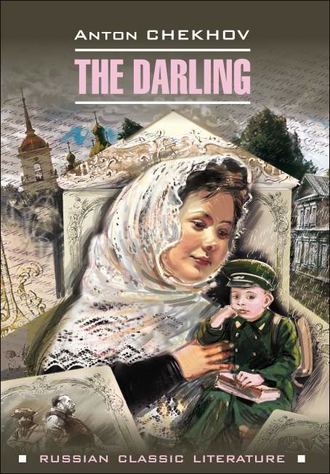
Антон Чехов
The darling / Душечка. Сборник рассказов
“How really nice it all was!” she sighed. “But we’re not having a slow time here either. We have a great many acquaintances, my dear, my best of friends! Tomorrow I will introduce you to a Russian family here, but please buy yourself another hat.” She scrutinised me and frowned. “Abbazzia is not the country,” she said; “here one must be comme il faut17.”
Then we went to the restaurant. Ariadne was laughing and mischievous all the time; she kept calling me “dear,” “good,” “clever,” and seemed as though she could not believe her eyes that I was with her. We sat on till eleven o’clock, and parted very well satisfied both with the supper and with each other.
Next day Ariadne presented me to the Russian family as: “The son of a distinguished professor whose estate is next to ours.”
She talked to this family about nothing but estates and crops, and kept appealing to me. She wanted to appear to be a very wealthy landowner, and did in fact succeed in doing so. Her manner was superb like that of a real aristocrat, which indeed she was by birth.
“But what a person my aunt is!” she said suddenly, looking at me with a smile. “We had a slight tiff, and she has bolted off to Meran. What do you say to that?”
Afterwards when we were walking in the park I asked her:
“What aunt were you talking of just now? What aunt is that?”
“That was a white lie,” laughed Ariadne. “They must not know I’m without a chaperon.”
After a moment’s silence she came closer to me and said:
“My dear, my dear, do be friends with Lubkov. He is so unhappy! His wife and mother are simply awful.”
She used the formal mode of address in speaking to Lubkov, and when she was going up to bed she said good-night to him exactly as she did to me, and their rooms were on different floors. All this made me hope that it was all nonsense, and that there was no sort of love affair between them, and I felt at ease when I met him. And when one day he asked me for the loan of three hundred roubles, I gave it to him with the greatest pleasure.
Every day we spent in enjoying ourselves and did nothing else; we strolled in the park, we ate, we drank. Every day there were conversations with the Russian family. By degrees I got used to the fact that if I went into the park I should be sure to meet the old man with jaundice, the Catholic priest, and the Austrian General, who always carried a pack of little cards, and wherever it was possible sat down and played patience, nervously twitching his shoulders. And the band played the same thing over and over again.
At home in the country I used to feel ashamed to meet peasants when I was fishing or on a picnic party on a working day; here I was ashamed too at the sight of footmen, coachmen, and the workmen who met us. It always seemed to me they were looking at me and thinking: “Why are you doing nothing?” And I was conscious of this feeling of shame every day from morning till night. It was a strange, unpleasant, monotonous time; it was varied only by Lubkov’s borrowing from me now a hundred, now fifty guldens, and being suddenly revived by the money as a morphia-maniac is by morphia, beginning to laugh loudly at his wife, at himself, at his creditors.
At last it began to be rainy and cold. We went to Italy, and I telegraphed to my father begging him for mercy’s sake to send me eight hundred roubles to Rome. We stayed in Venice, in Bologna, in Florence, and in every town invariably put up at an expensive hotel, where we were charged separately for lights, and for service, and for heating, and for bread at lunch, and for the right of having dinner by ourselves. We ate enormously. In the morning they gave us café complet; at one o’clock lunch: meat, fish, some sort of omelette, cheese, fruits, and wine. At six o’clock dinner of eight courses with long intervals, during which we drank beer and wine. At nine o’clock tea. At midnight Ariadne would declare she was hungry, and ask for ham and boiled eggs. We would eat to keep her company.
In the intervals between meals we used to rush about museums and exhibitions in continual anxiety for fear we should be late for dinner or lunch. I was bored at the sight of the pictures; I longed to be at home and have a rest; I was exhausted, looked about for a chair and hypocritically repeated after other people: “How exquisite, what atmosphere!” Like overfed boa constrictors, we noticed only the most glaring objects. The shop windows hypnotised us; we went into ecstasies over imitation brooches and bought a mass of useless trumpery.
The same thing happened in Rome, where it rained and there was a cold wind. After a heavy lunch we went to look at St. Peter’s, and thanks to our replete condition and perhaps the bad weather, it made no sort of impression on us, and detecting in each other an indifference to art, we almost quarrelled.
The money came from my father. I went to get it, I remember, in the morning. Lubkov went with me.
“The present cannot be full and happy when one has a past,” said he. “I have heavy burden left on me by the past. However, if only I get the money, it’s no great matter, but if not, I’m in a fix. Would you believe it, I have only eight francs left, yet I must send my wife a hundred and my mother another. And we must live here too. Ariadne’s like a child; she won’t think of money matters, and flings away money like a duchess. Why did she buy a watch yesterday? And tell me what object is there in our going on playing at being good children? Why, our hiding our relations from the servants and our friends costs us from ten to fifteen francs a day, as I have to have a separate room. What’s the object of it?”
I felt as though a sharp stone had been turned round in my chest. There was no uncertainty now; it was all clear to me. I turned cold all over, and at once made a resolution to give up seeing them, to run away from them, to go home at once …
“To get on well with a woman is easy enough,” Lubkov went on. “You have only to undress her; but afterwards what a bore it is, what a silly business!”
When I counted over the money I received he said:
“If you don’t lend me a thousand francs, I am faced with complete ruin. Your money is the only resource left to me.”
I gave him the money, and he revived at once and began laughing about his uncle, a queer fish, who could never keep his address secret from his wife. When I reached the hotel I packed and paid my bill. I had still to say good-bye to Ariadne.
I knocked at the door.
“Entrez!18”
The usual morning disorder was in her room: tea-things were scattered on the table, an unfinished roll, an eggshell; there was a strong overpowering reek of scent. The bed had not been made, and it was evident that two had slept in it.
Ariadne had only just got out of bed and was now in a flannel dressing-jacket with her hair down.
I said good morning to her, and then sat in silence for a minute while she tried to tidy her hair, and then I asked her, trembling all over:
“Why … why … did you send for me here?”
Evidently she guessed what I was thinking; she took me by the hand and said:
“I want you to be here, you are so pure.”
I felt ashamed of my emotion, of my trembling. And I was afraid I might begin sobbing, too! I went out without saying another word, and within an hour I was sitting in the train. All the journey, for some reason, I imagined Ariadne with a child, and she seemed disgusting to me, and all the women I saw in the trains and at the stations looked to me, for some reason, as if they too were with child, and they too seemed disgusting and pitiable. I was in the position of a greedy, passionate miser who should suddenly discover that all his gold coins were false. The pure, gracious images which my imagination, warmed by love, had cherished for so long, my plans, my hopes, my memories, my ideas of love and of woman – all now were jeering and putting out their tongues at me. “Ariadne,” I kept asking with horror, “that young, intellectual, extraordinarily beautiful girl, the daughter of a senator, carrying on an intrigue with such an ordinary, uninteresting vulgarian? But why should she not love Lubkov?” I answered myself. “In what is he inferior to me? Oh, let her love any one she likes, but why lie to me! But why is she bound to be open with me?” And so I went on over and over again till I sank into torpor.
It was cold in the train; I was travelling first class, but even so there were three on a side, there were no double windows, the outer door opened straight into the compartment, and I felt as though I were in the stocks, cramped, abandoned, pitiful, and my legs were fearfully numb, and at the same time I kept recalling how fascinating she had been that morning in her dressing-jacket and with her hair down, and I was suddenly overcome by such acute jealousy that I leapt up in anguish, so that my neighbours stared at me in wonder and positive alarm.
At home I found deep snow and twenty degrees of frost. I’m fond of winter; I’m fond of it because at that time, even in the hardest frosts, it’s particularly snug at home. It’s pleasant to put on one’s fur jacket and felt overboots on a clear frosty day, to do something in the garden or in the yard, or to read in a well-warmed room, to sit in my father’s study before the open fire, to wash in my country bath-house … Only if there is no mother in the house, no sister and no children, it is somehow dreary on winter evenings, and they seem extraordinarily long and quiet. And the warmer and snugger it is, the more acutely is this lack felt. In the winter when I came back from abroad, the evenings were endlessly long, I was intensely depressed, so depressed that I could not even read; in the daytime I was coming and going, clearing away the snow in the garden or feeding the chickens and the calves, but in the evening I was all alone.
I had never cared for visitors before, but now I was glad of them, for I knew there was sure to be talk of Ariadne. Kotlovitch, the spiritualist, often used to come to talk about his sister, and sometimes he brought with him his friend Prince Maktuev, who was as much in love with Ariadne as I was. To sit in Ariadne’s room, to finger the keys of her piano, to look at her music was a necessity for the prince – he could not live without it; and the spirit of his grandfather Ilarion was still predicting that sooner or later she would be his wife. The prince usually stayed a long time with us, from lunch till midnight, saying nothing all the time; in silence he would drink two or three bottles of beer, and from time to time, to show that he too was taking part in the conversation, he would laugh an abrupt, melancholy, foolish laugh. Before going home he would always take me aside and ask me in an undertone: “When did you see Ariadne Grigoryevna last? Was she quite well? I suppose she’s not tired of being out there?”
Spring came on. There was the harrowing to do and then the sowing of spring corn and clover. I was sad, but there was the feeling of spring. One longed to accept the inevitable. Working in the fields and listening to the larks, I asked myself: “Couldn’t I have done with this question of personal happiness once and for all? Couldn’t I lay aside my fancy and marry a simple peasant girl?”
Suddenly when we were at our very busiest, I got a letter with the Italian stamp, and the clover and the beehives and the calves and the peasant girl all floated away like smoke. This time Ariadne wrote that she was profoundly, infinitely unhappy. She reproached me for not holding out a helping hand to her, for looking down upon her from the heights of my virtue and deserting her at the moment of danger. All this was written in a large, nervous handwriting with blots and smudges, and it was evident that she wrote in haste and distress. In conclusion she besought me to come and save her. Again my anchor was hauled up and I was carried away. Ariadne was in Rome. I arrived late in the evening, and when she saw me, she sobbed and threw herself on my neck. She had not changed at all that winter, and was just as young and charming. We had supper together and afterwards drove about Rome until dawn, and all the time she kept telling me about her life. I asked where Lubkov was.
“Don’t remind me of that creature!” she cried. “He is loathsome and disgusting to me!”
“But I thought you loved him,” I said.
“Never,” she said. “At first he struck me as original and aroused my pity, that was all. He is insolent and takes a woman by storm. And that’s attractive. But we won’t talk about him. That is a melancholy page in my life. He has gone to Russia to get money. Serves him right! I told him not to dare to come back.”
She was living then not at an hotel, but in a private lodging of two rooms which she had decorated in her own taste, frigidly and luxuriously.
After Lubkov had gone away she had borrowed from her acquaintances about five thousand francs, and my arrival certainly was the one salvation for her.
I had reckoned on taking her back to the country, but I did not succeed in that. She was homesick for her native place, but her recollections of the poverty she had been through there, of privations, of the rusty roof on her brother’s house, roused a shudder of disgust, and when I suggested to her going home, she squeezed my hands convulsively and said:
“No, no, I shall die of boredom there!”
Then my love entered upon its final phase.
“Be the darling that you used to be; love me a little,” said Ariadne, bending over to me. “You’re sulky and prudent, you’re afraid to yield to impulse, and keep thinking of consequences, and that’s dull. Come, I beg you, I beseech you, be nice to me! … My pure one, my holy one, my dear one, I love you so!”
I became her lover. For a month anyway I was like a madman, conscious of nothing but rapture. To hold in one’s arms a young and lovely body, with bliss to feel her warmth every time one woke up from sleep, and to remember that she was there – she, my Ariadne! – oh, it was not easy to get used to that! But yet I did get used to it, and by degrees became capable of reflecting on my new position. First of all, I realised as before that Ariadne did not love me. But she wanted to be really in love, she was afraid of solitude, and above all I was healthy, young, vigorous; she was sensual, like all cold people, as a rule – and we both made a show of being united by a passionate, mutual love. Afterwards I realised something else, too.
We stayed in Rome, in Naples, in Florence; we went to Paris, but there we thought it cold and went back to Italy. We introduced ourselves everywhere as husband and wife, wealthy landowners. People readily made our acquaintance and Ariadne had great social success everywhere. As she took lessons in painting, she was called an artist, and you know, that quite suited her, though she had not the slightest trace of talent.
She would sleep every day till two or three o’clock; she had her coffee and lunch in bed. At dinner she would eat soup, lobster, fish, meat, asparagus, game, and after she had gone to bed I used to bring up something, for instance roast beef, and she would eat it with a melancholy, careworn expression, and if she woke at night she would eat apples and oranges.
The chief, so to say fundamental, characteristic of the woman was an amazing duplicity. She was continually deceitful every minute, apparently apart from any necessity, as it were by instinct, by an impulse such as makes a sparrow chirrup and a cockroach waggle its antennae. She was deceitful with me, with the footman, with the porter, with the tradesmen in the shops, with her acquaintances; not one conversation, not one meeting, took place without affectation and pretence. A man had only to come into our room – whoever it might be, a waiter or a baron – for her eyes, her expression, her voice to change, even the contour of her figure was transformed. At the very first glance at her then, you would have said there were no more wealthy and fashionable people in Italy than we are. She never met an artist or a musician without telling him all sorts of lies about his remarkable talent.
“You have such a talent!” she would say, in honeyed cadences, “I’m really afraid of you. I think you might see right through people.”
And all this simply in order to please, to be successful, to be fascinating! She woke up every morning with the one thought of “pleasing”! It was the aim and object of her life. If I had told her that in such a house, in such a street, there lived a man who was not attracted by her, it would have caused her real suffering. She wanted every day to enchant, to captivate, to drive men crazy. The fact that I was in her power and reduced to a complete nonentity before her charms gave her the same sort of satisfaction that visitors used to feel in tournaments. My subjection was not enough, and at nights, stretched out like a tigress, uncovered – she was always too hot – she would read the letters sent her by Lubkov; he besought her to return to Russia, vowing if she did not he would rob or murder some one to get the money to come to her. She hated him, but his passionate, slavish letters excited her. She had an extraordinary opinion of her own charms; she imagined that if somewhere, in some great assembly, men could have seen how beautifully she was made and the colour of her skin, she would have vanquished all Italy, the whole world. Her talk of her figure, of her skin, offended me, and observing this, she would, when she was angry, just to vex me, say all sorts of vulgar things, taunting me. One day when we were at the summer villa of a lady of our acquaintance and she lost her temper, she even went so far as to say: “If you don’t leave off boring me with your sermons, I’ll undress this minute and lie naked here on these flowers.”
Often looking at her asleep, or eating, or trying to assume a naїve expression, I wondered why that extraordinary beauty, grace, and intelligence had been given her by God. Could it simply be for lolling in bed, eating and lying, lying endlessly? And was she really intelligent? She was afraid of three candles in a row, of the number thirteen, was terrified of spells and bad dreams. She argued about free love and freedom in general like a bigoted old woman, declared that Boleslav Markevitch was a better writer than Turgenev19. But she was diabolically cunning and sharp, and knew how to seem a highly educated, advanced person in a company.
Even at a moment of good humour, she could always insult a servant or kill an insect without a pang; she liked bull-fights, liked to read about murders, and was angry when prisoners were acquitted.
For the life Ariadne and I were leading, we had to have a great deal of money. My poor father sent me his pension, all the little sums he received, borrowed for me wherever he could, and when one day he answered me: “Non habeo20,” I sent him a desperate telegram in which I besought him to mortgage the estate. A little later I begged him to get money somehow on a second mortgage. He did this too without a murmur and sent me every farthing. Ariadne despised the practical side of life; all this was no concern of hers, and when flinging away thousands of francs to satisfy her mad desires I groaned like an old tree, she would be singing “Addio bella Napoli” with a light heart.
Little by little I grew cold to her and began to be ashamed of our liaison21. I am not fond of pregnancy and confinements, but now I sometimes dreamed of a child who would have been at least a formal justification of our life. In order that I might not be completely disgusted with myself, I began reading and visiting museums and galleries, gave up drinking and took to eating very little. If one keeps oneself well in hand from morning till night, one’s heart seems lighter. I began to bore Ariadne too. The people with whom she won her triumphs were, by the way, all of the middling sort; as before, there were no ambassadors, there was no salon, the money did not run to it, and this mortified her and made her sob and she announced to me at last that perhaps she would not be against our returning to Russia.
And here we are on our way. For the last few months she has been zealously corresponding with her brother; she evidently has some secret projects, but what they are – God knows! I am sick of trying to fathom her underhand schemes! But we’re going not to the country, but to Yalta and afterwards to the Caucasus. She can only exist now at watering-places, and if you knew how I hate all these watering-places, how suffocated and ashamed I am in them. If I could be in the country now! If I could only be working now, earning my bread by the sweat of my brow, atoning for my follies. I am conscious of a superabundance of energy and I believe that if I were to put that energy to work I could redeem my estate in five years. But now, as you see, there is a complication. Here we’re not abroad, but in mother Russia; we shall have to think of lawful wedlock. Of course, all attraction is over; there is no trace left of my old love, but, however that may be, I am bound in honour to marry her.
Shamohin, excited by his story, went down with me and we continued talking about women. It was late. It appeared that he and I were in the same cabin.
“So far it is only in the village that woman has not fallen behind man,” said Shamohin. “There she thinks and feels just as man does, and struggles with nature in the name of culture as zealously as he. In the towns the woman of the bourgeois or intellectual class has long since fallen behind, and is returning to her primitive condition. She is half a human beast already, and, thanks to her, a great deal of what had been won by human genius has been lost again; the woman gradually disappears and in her place is the primitive female. This dropping-back on the part of the educated woman is a real danger to culture; in her retrogressive movement she tries to drag man after her and prevents him from moving forward. That is incontestable.”
I asked: “Why generalise? Why judge of all women from Ariadne alone? The very struggle of women for education and sexual equality, which I look upon as a struggle for justice, precludes any hypothesis of a retrograde movement.”
But Shamohin scarcely listened to me and he smiled distrustfully. He was a passionate, convinced misogynist22, and it was impossible to alter his convictions.
“Oh, nonsense!” he interrupted. “When once a woman sees in me not a man, not an equal, but a male, and her one anxiety all her life is to attract me – that is, to take possession of me – how can one talk of their rights? Oh, don’t you believe them; they are very, very cunning! We men make a great stir about their emancipation, but they don’t care about their emancipation at all, they only pretend to care about it; they are horribly cunning things, horribly cunning!”
I began to feel sleepy and weary of discussion. I turned over with my face to the wall.
“Yes,” I heard as I fell asleep – “yes, and it’s our education that’s at fault, sir. In our towns, the whole education and bringing up of women in its essence tends to develop her into the human beast – that is, to make her attractive to the male and able to vanquish him. Yes, indeed” – Shamohin sighed – “little girls ought to be taught and brought up with boys, so that they might be always together. A woman ought to be trained so that she may be able, like a man, to recognise when she’s wrong, or she always thinks she’s in the right. Instil into a little girl from her cradle that a man is not first of all a cavalier or a possible lover, but her neighbour, her equal in everything. Train her to think logically, to generalise, and do not assure her that her brain weighs less than a man’s and that therefore she can be indifferent to the sciences, to the arts, to the tasks of culture in general. The apprentice to the shoemaker or the house painter has a brain of smaller size than the grown-up man too, yet he works, suffers, takes his part in the general struggle for existence. We must give up our attitude to the physiological aspect, too – to pregnancy and childbirth, seeing that in the first place women don’t have babies every month; secondly, not all women have babies; and, thirdly, a normal countrywoman works in the fields up to the day of her confinement and it does her no harm. Then there ought to be absolute equality in everyday life. If a man gives a lady his chair or picks up the handkerchief she has dropped, let her repay him in the same way. I have no objection if a girl of good family helps me to put on my coat or hands me a glass of water —”
I heard no more, for I fell asleep.
Next morning when we were approaching Sevastopol, it was damp, unpleasant weather; the ship rocked. Shamohin sat on deck with me, brooding and silent. When the bell rang for tea, men with their coat-collars turned up and ladies with pale, sleepy faces began going below; a young and very beautiful lady, the one who had been so angry with the Customs officers at Volotchisk, stopped before Shamohin and said with the expression of a naughty, fretful child:
“Jean, your birdie’s been sea-sick.”
Afterwards when I was at Yalta I saw the same beautiful lady dashing about on horseback with a couple of officers hardly able to keep up with her. And one morning I saw her in an overall and a Phrygian cap, sketching on the sea-front with a great crowd admiring her a little way off. I was introduced to her. She pressed my hand with great warmth, and looking at me ecstatically, thanked me in honeyed cadences for the pleasure I had given her by my writings.
“Don’t you believe her,” Shamohin whispered to me, “she has never read a word of them.”
When I was walking on the sea-front in the early evening Shamohin met me with his arms full of big parcels of fruits and dainties.
“Prince Maktuev is here!” he said joyfully. “He came yesterday with her brother, the spiritualist! Now I understand what she was writing to him about! Oh, Lord!” he went on gazing up to heaven and pressing his parcels to his bosom. “If she hits it off with the prince it means freedom, then I can go back to the country with my father!”
And he ran on.
“I begin to believe in spirits,” he called to me, looking back. “The spirit of grandfather Ilarion seems to have prophesied the truth! Oh, if only it be so!”
The day after this meeting I left Yalta and how Shamohin’s story ended I don’t know.







